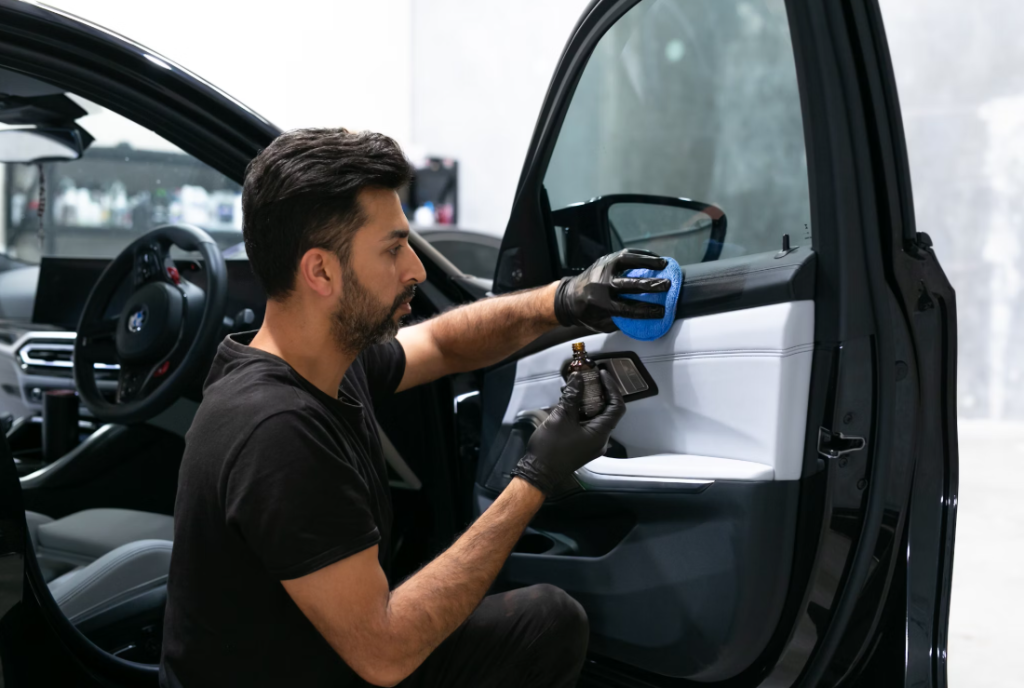Car Detailing Services: Who Gives Your Ride the VIP Treatment?
## Introduction
Let’s be honest—your car deserves more than a quick hose-down at the local gas station. It’s your second home, your road-trip companion, your statement piece. But when it comes to real care, car detailing is what separates a clean ride from a showroom masterpiece. So who really gives your car the VIP treatment?
## What Is Car Detailing?
Car detailing is like giving your vehicle a spa day. It’s a thorough cleaning, restoration, and finishing process for both the interior and exterior. This goes far beyond what you get with a standard car wash.
### Detailing vs. Car Wash: What’s the Difference?
Think of a car wash as fast food and detailing as gourmet cuisine. A wash might rinse off dirt, but detailing gets into the nooks and crannies, polishes the paint, and revitalizes the interior down to the fibers of your floor mats.
### Interior vs. Exterior Detailing
Exterior detailing focuses on paint correction, waxing, and tire care. Interior detailing dives deep—vacuuming, steam-cleaning, and conditioning every surface you touch.
## Why Car Detailing Is More Than Just Aesthetic
Sure, a shiny car looks great. But detailing goes beyond appearances.

### Value Preservation
Consistent detailing protects your car’s resale value. UV rays, bird droppings, and road salt can damage your paint and reduce your vehicle’s worth. Regular detailing helps mitigate that.
### Health Benefits
Dirty vents and carpets harbor allergens and bacteria. Interior detailing sanitizes your environment, improving the air you breathe while driving.
### Psychological Satisfaction
Ever notice how a clean car feels better to drive? There’s a real mental lift that comes with driving a freshly detailed car—it’s like starting your day with a made bed.
## Types of Car Detailing Services
Car detailing is a broad field with lots of moving parts—literally.
### Exterior Car Detailing
#### Washing and Drying
This is the first step—using specialized products and techniques like two-bucket washing or foam cannons to avoid swirl marks.

#### Claying and Polishing
Clay bars remove microscopic contaminants. Polishing smooths the surface and removes minor scratches, restoring that deep, glossy finish.
#### Waxing and Sealing
Wax adds a protective layer that repels water and UV rays, while sealants provide longer-lasting protection.
### Interior Car Detailing
#### Vacuuming and Brushing
Vacuuming reaches deep into carpets and seats. Brushing dislodges embedded dirt from fabric surfaces.
#### Shampooing and Steam Cleaning
These methods target stains and odors, leaving upholstery looking and smelling fresh.
#### Leather and Trim Conditioning
Conditioners keep leather soft and prevent cracking. Trim products revive faded plastic and rubber.
## Advanced Detailing Services
Want to go the extra mile? These premium services are worth the investment.
### Paint Correction
Using polishing machines and compounds, this process eliminates swirl marks and scratches, bringing your paint back to life.
### Ceramic Coating
A high-tech solution that bonds to your paint to form a protective, hydrophobic layer. It lasts for years and outperforms traditional wax.
### Engine Bay Cleaning
A clean engine bay not only looks great but can help you spot leaks or issues before they become costly problems.
## Mobile Detailing vs. Shop Detailing
Not all detailing happens in a garage.

### Pros and Cons of Mobile Detailing
Mobile detailers come to you. It’s convenient, but they may lack access to high-end tools. Weather can also affect service quality.
### Pros and Cons of In-Shop Detailing
Shops offer more advanced equipment and controlled environments. The downside? You need to drop off your vehicle and wait.
## How to Choose the Right Car Detailing Service
Not all detailers are created equal. Here’s what to look for:
### Certification and Training
Look for professionals certified by organizations like the IDA (International Detailing Association). It’s a sign they know what they’re doing.
### Products and Equipment Used
High-quality products and tools matter. If they’re using cheap soaps and rags, run the other way.
### Reviews and Testimonials
What do other customers say? Online reviews often reveal the true nature of a service.
## Pricing: What Should You Expect?
Detailing prices vary widely—from $50 to over $500 depending on the vehicle size and service level. Don’t just go for the cheapest; you often get what you pay for.

## Common Myths About Car Detailing
### “It’s Just a Fancy Car Wash”
False. Detailing is restorative and protective. It enhances your car’s condition, not just its look.
### “It’s Only for Luxury Cars”
Not true. Every vehicle benefits from detailing. Whether you drive a Bentley or a Buick, it’s worth it.
## The Future of Car Detailing
Technology and sustainability are reshaping the industry.
### Eco-Friendly Products and Techniques
Waterless washes and biodegradable products are becoming the norm, reducing the environmental footprint.
### AI and Automation
Expect AI-powered robots to handle polishing or inspections, ensuring consistent results with machine precision.
## Conclusion
Car detailing isn’t a luxury—it’s a commitment to vehicle health and pride of ownership. Whether you’re prepping for resale or just love that new-car feeling, detailing services deliver the kind of care your vehicle deserves. Don’t just drive—arrive in style.
## FAQs
Q1: How often should I get my car detailed?
A: Ideally, every 3 to 6 months depending on usage and environment.
Q2: Is car detailing worth the money?
A: Absolutely. It preserves value, improves comfort, and even boosts your mood while driving.
Q3: Can detailing fix scratches?
A: Minor scratches, yes—especially through paint correction. Deep scratches may require touch-ups.
Q4: How long does a full detail take?
A: Anywhere from 2 to 6 hours depending on the package and car condition.
Q5: What’s the best time of year to get detailing done?
A: Spring and fall are ideal—before and after extreme weather conditions take their toll.









Post Comment